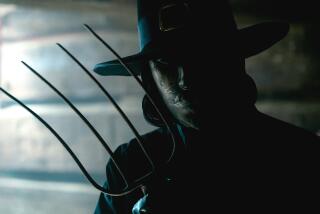Review: ‘Black Christmas’ decks the patriarchy and slashes expectations with glee
- Share via
The biggest gross-out moment in “Black Christmas” isn’t the gory death of a sorority girl at the gloved hands of a masked killer. Instead, it’s the scene where a cop globs mayonnaise onto white bread. This PG-13 remake of Bob Clark’s 1974 slasher classic follows in the feminist footsteps of its predecessor, while still subverting audience expectations at each opportunity. Fans of the original — and those who like their horror movies deadly serious and brimming with blood — might not love writer-director Sophia Takal’s take, but “Black Christmas” is a fun film that gets its kicks out of literally smashing the patriarchy.
Structural misogyny is alive and well on the Hawthorne College campus, whether in the form of white-male-author-loving professor Gelson (Cary Elwes) or the fraternities like Delta Kappa Omega where sexual assault is brushed under the beer-stained rugs. But Riley (Imogen Poots) and her sorority sisters at Mu Kappa Epsilon are fighting back, and their efforts have made them targets of a killer who is stalking the quad as campus quiets for the holidays. Sorority girls — ahem, women — begin disappearing, while Riley is getting creepy DMs from someone claiming to be Hawthorne’s long-dead founder who seems to have chosen her as his next victim.
While Takal’s previous work — her stunning debut “Always Shine” and the solid “New Year, New You” episode of Hulu’s “Into the Dark — focused on the pain women inflict on one another as a result of society’s pressures, “Black Christmas” is more concerned with men as its villains. Clark’s film wore its second-wave feminism on its ’70s-era blouse sleeves, so it shouldn’t be surprising that Takal’s “Black Christmas” is a women’s horror film for a new generation, full of cheeky pro-female T-shirts and casual talk about menstrual cups.
But this version doesn’t just update the disturbing phone calls of the original for menacing DMs; it gives the sorority sisters the agency to fight back in ways Clark’s movie didn’t. The script from Takal and April Wolfe isn’t subtle in its message about the dangers of toxic masculinity and rape culture versus the power of female solidarity, but it also has fun with its feminist themes in ways that will have like-minded viewers cheering and the less-enlightened shaking their fists. While the commentary is pointed, their screenplay is often blunt, hammering home the film’s larger ideas. Beyond Riley, the sorority sisters feel largely interchangeable, and more characterization could have helped invest the audience more deeply in their safety and survival.
The PG-13 rating for “Black Christmas” might seem like a ploy for a larger, younger audience, but the lack of explicit violence feels more like a deliberate choice for Takal. The genre often glories in the gory deaths of women, but “Black Christmas” cuts away from the kill shot.
In Sophia Takal’s horror remake “Black Christmas,” sorority women fight for their lives against a masked killer. But for Takal, the real villain is misogyny.
This doesn’t always work — sacrificing visual coherence and sometimes leaving the audience wondering exactly what just happened — but it subverts the usual visual pleasures and terrors of horror films in a manner aligned with its larger themes. This remains a horror film, but it’s a sometimes enjoyably goofy one that prefers to make its audience laugh than to make them scream.
‘Black Christmas’
Rated: PG-13, for violence, terror, thematic content involving sexual assault, language, sexual material and drinking
Running time: 1 hour, 33 minutes
Playing: Starts Dec. 13 in general release
More to Read
Only good movies
Get the Indie Focus newsletter, Mark Olsen's weekly guide to the world of cinema.
You may occasionally receive promotional content from the Los Angeles Times.











